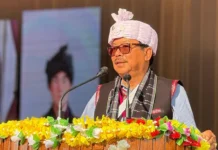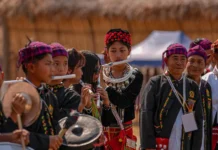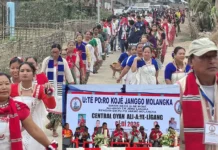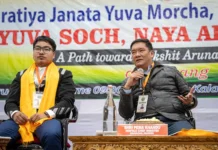[Taba Ajum]
In October 2015, at the height of the power struggle between the then chief minister Nabam Tuki and his rival Kalikho Pul, Tuki sprung a big surprise by reshuffling his cabinet and inducting three new faces.
The new ministers were Phurpa Tsering, Jomde Kena and Tirong Aboh. The induction of Aboh was a major surprise, considering that he was unknown to the rest of the state. Not many knew much about the rookie politician.
After the swearing in, Aboh had shocked everyone by touching the feet of Tuki to seek his blessing. The moment was captured by cameramen present on the occasion, and it became something of an iconic picture. A tribal man touching the feet of a fellow tribal to show respect was unthinkable a few years ago. This simple act of touching the feet generated a lot of interest in Tirong Aboh among the journalists. Many wanted to know who this enigmatic politician was who, out of the blue, became a cabinet minister and also touched the feet of his CM.
Aboh’s tenure as minister was short-lived. Over the course of time, he remained loyal to Tuki, but later shifted his political allegiance to Takam Pario.
Aboh and I were not exactly friends, but we often used to catch up during the assembly sessions and have conversations on various issues. He was a very straightforward person. Especially on the Naga militant issue, he spoke passionately. Most of the MLAs of Tirap, Changlang and Longding never dare to speak out against the NSCN militants. But Aboh was different. He strongly opposed the presence of the NSCN, especially in his home district, Tirap.
He once told me that he had twice escaped assassination attempts on his life. In one instance, he said, he had even physically fought with NSCN militants. There was no doubt that Aboh was a brave man who stood up against militancy.
However, some people, especially from his district, accused him of being in touch with militants. I once asked him about it, and he said, “Some say I am close to the K faction, and others say I formed the Arunachal Naga Liberation Army. These are all false allegations to tarnish my image.”
Whatever the differences might have been, the manner in which Aboh was killed, along with 10 others, including his 20-year-old son, was absolutely wrong. What wrong had the young soul done to be killed in such a ruthless manner?
The gruesome massacre of the 11 people has shocked the whole state. Everybody is sad and angry over how the militants came into the state, killed people, and escaped without being caught. There should have been a huge outpouring of protests. But the normally very active student unions, associations and organizations, especially those based in the capital region, are mostly quiet. Barring a few, a majority of them did not even issue any press statement.
Today the rest of the state might think that NSCN militancy is a matter of concern only for the people of Tirap, Changlang and Longding. But the people should remember that the world once used to think that terrorism was only an issue for countries like India, Pakistan, Israel, etc, until the Al Qaeda hit the USA. People may have differences of opinion over Aboh and his brand of politics, but there is no denying that he died a brave man. The words ‘intellectual’ and ‘martyr’ are the most misused ones in the state. Even so, I would like to remember Aboh as a martyr who bravely stood up against the tyranny of the NSCN and inspired several others to do the same.
His murderers may have managed to kill him but not his idea of having an NSCN-free Tirap. In fact, the horrific massacre has inspired thousands of people to work harder to make Tirap, Changlang and Longding an NSCN-free district.




